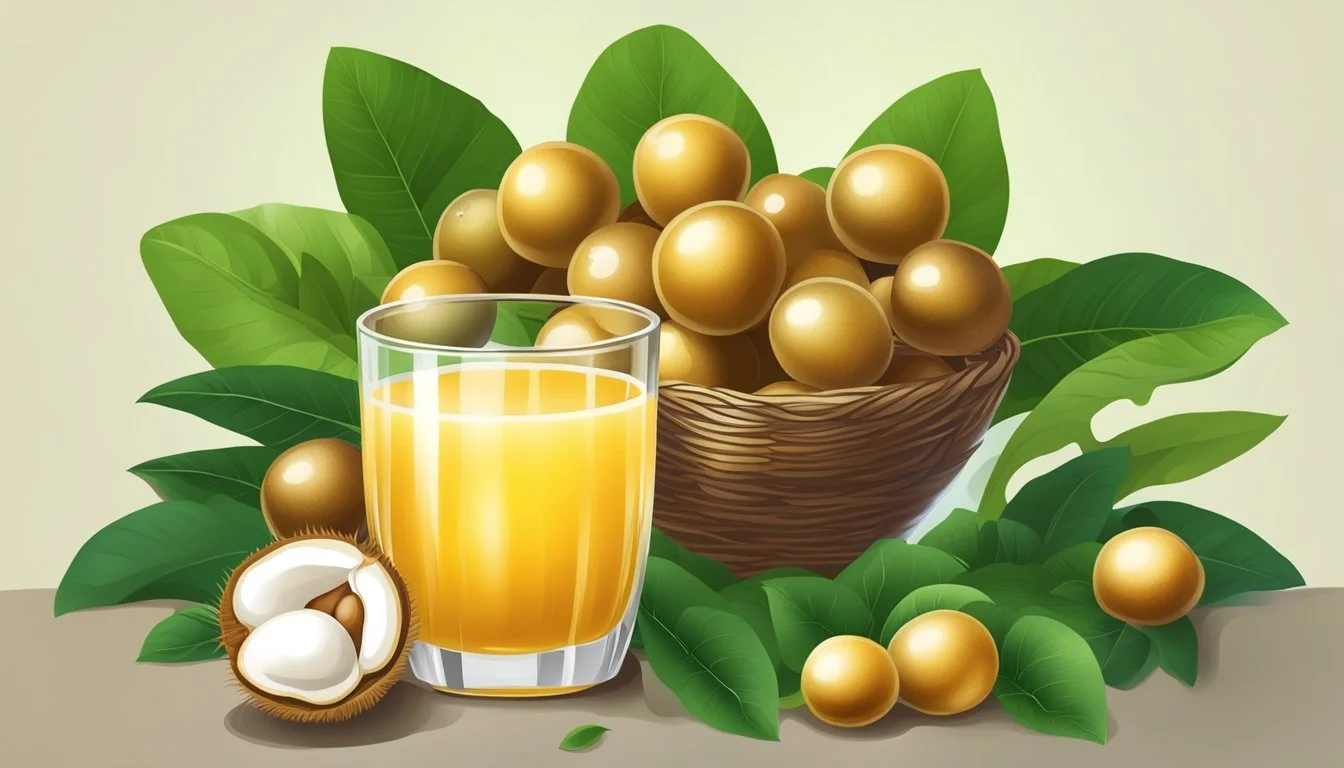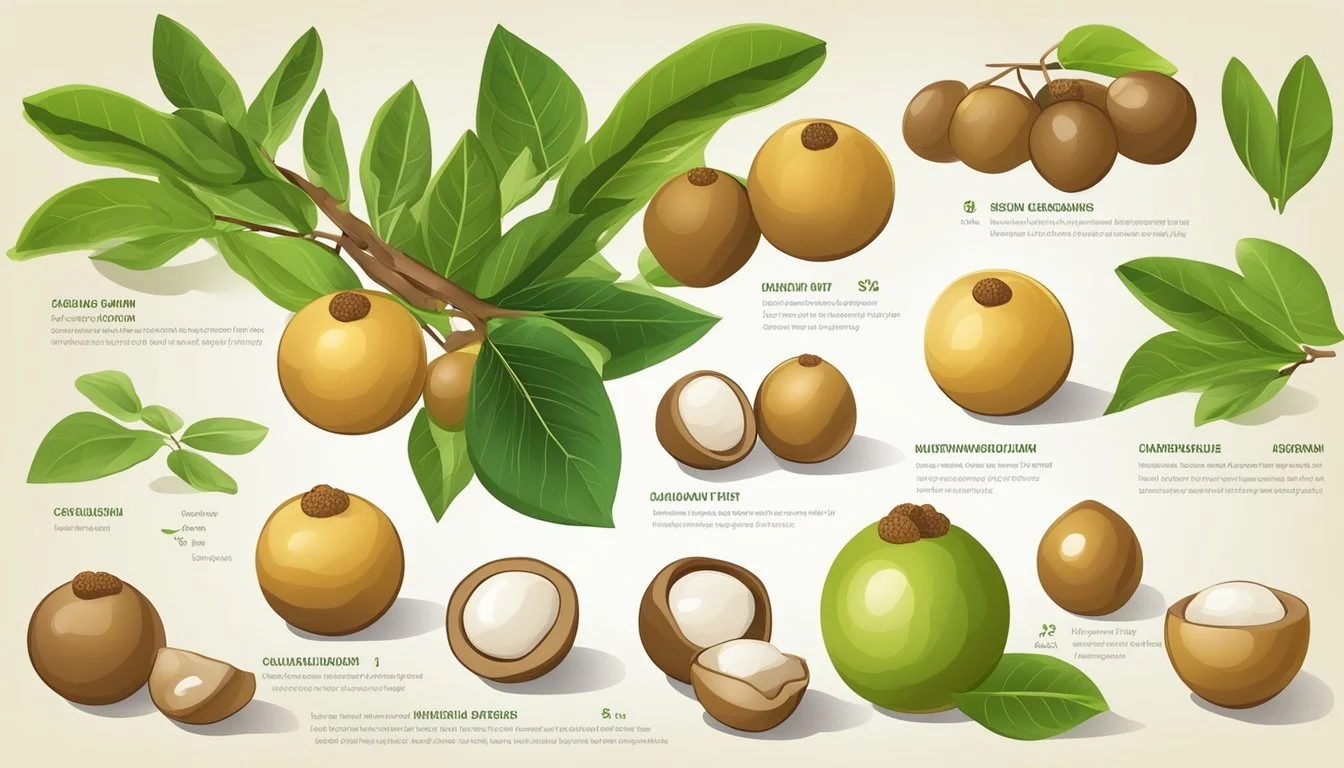What Are the Health Benefits of Longan Fruit?
Uncovering Nutritional Secrets
Longan, a tropical fruit (What wine goes well with fruit?) known for its sweet and juicy taste, has been widely consumed for both its culinary appeal and its medicinal properties. This small, round fruit, which boasts a translucent white flesh encased in a thin brown shell, is not only a favorite snack but also a source of various health benefits. Packed with nutrients, longan is particularly revered for its high vitamin C content, contributing significantly to the daily dietary requirements.
The health benefits attributed to longan extend beyond its vitamin C richness. The fruit is a natural reservoir of polyphenols, plant compounds that are known to offer various health effects. Studies suggest that these compounds can play a role in improving overall heart health and may aid in reducing blood pressure. The application of longan in traditional medicine also highlights its potential in nourishing blood, enhancing memory, and promoting better sleep patterns, alluding to its calming effects on the body's nervous system. Its array of nutrients supports immune function and skin health while potentially holding anti-aging properties.
Nutritional Profile of Longan Fruit
Longan fruit is praised for its nutritionally rich profile, which includes a variety of essential vitamins and minerals, as well as a balance of macronutrients. It offers a nutrient-dense snacking option with a relatively low-caloric content.
Vitamins and Minerals Content
Longan fruit is an excellent source of Vitamin C, an antioxidant vital for the immune system and skin health. The fruit also provides other essential minerals, including:
Potassium: Important for maintaining healthy blood pressure levels.
Iron: Crucial for blood production and oxygen transport.
Magnesium: Supports muscle and nerve functions and energy production.
Phosphorus: Assists in the formation of bones and teeth.
Calcium: Essential for bone health and plays a role in heart, muscle, and nerve functions.
Manganese: Helps the body form connective tissue, bones, and blood clotting factors.
These nutrients contribute to the overall beneficial properties of the longan fruit, making it a valuable addition to a balanced diet.
Macronutrients: Carbs, Proteins, and Fats
Longans have a high carbohydrate content, primarily from natural sugars, which provide a quick energy source. The macronutrient breakdown in a serving (about 20 pieces) of fresh longan is as follows:
Calories: 38
Protein: 1 gram, which supports tissue repair and growth.
Fat: 0 grams, making it a virtually fat-free alternative for those monitoring their fat intake.
Carbohydrates: 10 grams, mainly from sugars and dietary fiber which aids in digestion.
This macronutrient balance makes longan fruit suitable for those seeking a nutritious, low-fat snack option.
Health Benefits of Longan Fruit
Longan fruit, known for its sweet and floral flavors, comes with a bundle of health benefits ranging from immune support to cognitive enhancement. Its rich composition of vitamins, minerals, and antioxidants makes it an excellent addition to a healthy diet.
Enhancing Immune Function
The immune system benefits from the high vitamin C content found in longan fruit. Vitamin C is essential for combating infections and maintaining the body's natural defenses. Additionally, polysaccharides present in longan have been shown to enhance immune function by stimulating white blood cell activity.
Antioxidative and Anti-Inflammatory Properties
Longan contains antioxidants such as polyphenols, flavonoids, gallic acid, and ellagic acid, which help in reducing oxidative stress and inflammation. These antioxidants neutralize harmful free radicals, which can reduce the risk of chronic diseases and may protect against cellular damage and inflammation that could lead to cancer.
Cognitive Benefits and Stress Reduction
Known to contain compounds that support brain health, longan may improve memory and reduce stress. A key benefit of this fruit is its potential to boost energy levels and alleviate fatigue, which in turn can enhance cognitive functioning and reduce the effects of stress on the body.
Supporting Skin Health and Anti-Aging
The antioxidants in longan fruit can also bolster skin health by protecting against UV radiation and contributing to collagen production, which is crucial for skin elasticity. Regular consumption might aid in slowing down the signs of aging, thanks to the anti-aging properties attributed to its various antioxidants and vitamins.
Cultural and Traditional Uses
In various cultures, longan fruit, known for its unique taste and nutritional properties, has been used for centuries. Especially in Chinese medicine, the fruit is prized, while elsewhere, it's a staple ingredient in both fresh and dried forms.
Longan in Chinese Medicine
In Traditional Chinese Medicine (TCM), longan, or "dragon's eye," is not only a fruit to be consumed for nutrition, but also a component in health treatments. TCM perceives longan as having a sweet taste and a warm energy, making it useful in nourishing the heart and spleen, and for promoting blood health. Typically, the flesh and the seed are incorporated into dietary prescriptions. The longan fruit is commonly found in soups and teas, believed to address issues like insomnia and anxiety due to its calming properties.
Global Culinary Uses
Across the globe, longan is embraced in numerous culinary applications, accentuating its sweet and tropical flavor. In countries like Taiwan, Thailand, Vietnam, and India, longan is either eaten fresh or dried. The dried version holds a significant place in various dishes, lending a distinct sweetness.
Fresh longan is often eaten as a snack, much like other fruits (What wine goes well with fruits?) in the soapberry family, such as lychee and rambutan.
Dried longan is used in desserts or brewed in teas.
In culinary practices, it's also found canned for convenience or transformed into smoothies for a refreshing beverage.
The fruit is sourced from the longan tree, which bears the resemblance to an eyeball when shelled due to its black seed and translucent flesh, leading to its nickname "dragon's eye." This tropical fruit is not just a delicious component but also a culturally significant one in many of the areas where it's grown and consumed.
Considerations and Potential Side Effects
While the longan fruit is appreciated for its taste and potential health benefits, it is important to consider the dietary moderation and potential side effects. Consumption should align with individual health profiles and dietary needs.
Dietary Moderation and Allergy Information
Longan fruit is naturally high in sugar, which necessitates moderation, particularly for those managing diabetes or monitoring blood sugar levels. Overconsumption could result in a spike in blood sugar. Additionally, as with any food, there is a risk of allergy. Those who experience allergic reactions to longan should avoid it and seek medical advice.
The water content in longan can be beneficial for hydration, but excess intake may affect sleep patterns, potentially causing insomnia or anxiety in sensitive individuals. It's also been noted that in traditional practices, longan was used to treat snake bites and pain. However, there is a lack of robust scientific evidence supporting these uses.
Interactions and Contraindications
The USDA underscores the importance of a balanced diet, which implies that even healthful fruits like longan should be consumed in moderation. There are no well-documented interactions or contraindications with medications, but due to the lack of comprehensive studies, it is advisable to consult healthcare providers before consuming longan if on medication or managing chronic diseases.
Research on animals, such as mice, has explored the impact of longan on metabolism and energy, but human studies are necessary to validate these findings. Individuals with concerns about chronic disease, constipation, or maintaining a regulated blood pressure may seek to incorporate longan as part of a balanced diet.
Note that the potential drawbacks of longan are not well established, indicating a need for further scientific exploration. In summary, while longan fruit can be a delightful and nutritious addition to the diet, balance and individual health conditions should guide its consumption.
Frequently Asked Questions
The following subsections address common inquiries about the health benefits and considerations surrounding longan fruit consumption.
What advantages does longan fruit have for skin health?
Longan fruit may contribute to healthier skin by providing vitamins and antioxidants that can combat signs of aging. The vitamin C content, for example, helps in collagen synthesis which might reduce wrinkles and improve skin elasticity.
Can longan consumption affect blood sugar levels in diabetics?
Due to its carbohydrate content, longan fruit can potentially raise blood sugar levels. Diabetics should monitor their blood sugar and consume it in moderation as part of a balanced diet.
How does longan fruit support weight loss efforts?
Longan fruit is low in calories and fat, which makes it a potentially beneficial addition to a weight loss diet when eaten in reasonable quantities. Furthermore, its sweetness might help satisfy sugar cravings without the high calorie count of more sugary snacks.
What nutritional value does 100g of longan provide?
100 grams of longan fruit provides roughly 60 calories, predominantly from carbohydrates. It's also a source of vitamin C and contains small amounts of minerals such as potassium.
Are there any specific benefits of longan fruit during pregnancy?
The vitamin C in longan fruit is essential for both the mother and the developing fetus, supporting the immune system and aiding in the absorption of iron. However, its consumption should still be discussed with a healthcare provider due to potential sugar content and varying nutrient needs during pregnancy.
What are potential reasons for some individuals to avoid eating longan fruit?
Individuals might need to avoid longan fruit if they have allergies or if they are sensitive to its sugar content. Since longan is a tropical fruit, those with a history of fruit allergies should approach with caution and consult with a healthcare professional.






